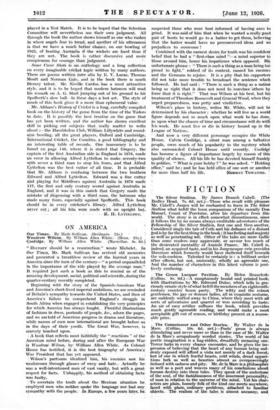ON AMERICA " Hisronv should be a resurrection," Wrote Michelet.
In Our Times, Mr. Mark Sullivan has revived old memories and presented a _breathless- review of the hurried years in America since the turn of the century—" a period unparalleled: in the importance of the -role played by the average man."_ It required just such a book as this to remind us of the amazing development, social, political and scientific, during the quarter-century recently completed.
Beginning with the story of the Spanish-American War: and America's short-lived imperial ambitions, we are reminded: of Britain's sympathy towards the United States, and then of America's failure to comprehend England's struggle in South Africa when engaged in establishing the very principles for which America has always fought. Plentiful illustrations Of fashions in dress, portraits of people, Sze., adorn the pages, and we are told of American progress in drama and literature,: while names of men now international are brought before uk is the days of their youth. The Great War, however, in scarcely touched upon.
A book that reflects most faithfully the " reactions " of the American mind before, during and after the European War: is Woodrow. Wilson,. by William Allen White. As Colonel: House has testified, it is the best :biography of America's: War President that has yet appeared. .
Wilson's- partisans - idealized hint; his enemies saw his weaknesses . through- glasses , of envy and hate.. Actually he was a well-intentioned man of vast vanity, but with a great- respect for facts. Unhappily, his method of obtaining facts, was faulty.
To ascertain 'the truth about the- Mexican situation he einpl6yed men who neither spoke the language nor had any: sympathy with the people. - In Europe, a- few Tears later, he. suspected those who were best informed of having axes to grind. It was said of him that when he wanted a really good pair of boots he would go to a hatter to get them, believing that -the hatter would have no preconceived ideas and no prejudices to overcome !
Combined with the earnest desire for truth was his confident belief that he had a "first-class mind '—a-mind superior VI those around him, hence his impatience when opposed. His Unfortunate phrase : "There is such a thing as a man being to proud to fight," robbed of its context, caused his enemies and the Germans to rejoice. It is a pity that his supporter; did not take more trouble to broadcast the sentence which followed. He had said : "There is such a thing as a nation being so right ' that it does not need to convince Others by force that it is right." That was Wilson at his best, but his treatment of Theodore Roosevelt and General Wood, when they Urged preparedness, was petty and vindictive.
Wilson's place in history, writes Mr. White, will not be determined by his character ; whether he will live as a world 'figure depends not so much upon what work he has done, as upon what the chance of time and circumstance will do wall his work. He must live or die in history bound up in the. League of Nation
• And now a very different personage occupies the Whitt House. Calvin Coolidge, a silent man among a talkative people, owes much of his popularity to the mystery which also surrounded Colonel House until recently. :Coolidge has become a figure of importance largely by reason of this
quality of silence. All his life he has devoted himself frankly: to polities. "What is your hobby ?".he was asked. "Holding Office," said he ; and he has held office of one sort or another






















































 Previous page
Previous page